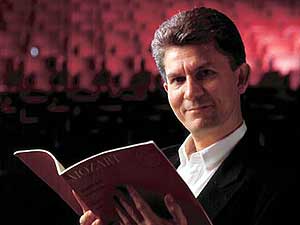|
Audio
Photos
More from MPR
Your Voice
|
SPCO musicians take charge
January 16, 2004
 |
| Andreas Delfs will step down at the end of the current season as the SPCO adopts a new management model. (Image courtesy of the St. Paul Chamber Orchestra) |
St. Paul, Minn. — The tradition of orchestras lead by one person, the music director, began in Europe but is not nearly as pervasive as it once was. For a constellation of reasons, it as persevered in America, however, not without some frustration.
Modern orchestral economics mean many music directors often hold more than one job, across the continent and around the world.
St. Paul Chamber Orchestra Board Chairman Lowell Noteboom says music directors across the country have become spread too thin. Noteboom says the result is that music directors just can't do what the job historically has required.
"I think what we have done, perhaps uniquely, is to actually come to grips with that, and figure out a model which works for us in our own unique situation," he says.
What the SPCO has done is establish two committees, each consisting of three musicians and two management personnel. They will decide on everything from programming, guest artists, touring and recording, to hiring and firing decisions. To some extent the SPCO has been democratized, but not to the point of 'one musician - one vote.'
A number of informal channels have been set up for the musicians to air their views, but the two committees have the ultimate say. Jesse Rosen, Vice President of the American Symphony Orchestra League, says the committee system gives the SPCO's musicians input they've never had before, but making it work won't be easy.
"The challenge in committee processes or groups processes," Rosen says, "is to avoid getting into a place where you're trying to satisfy a lot of constituency concerns and issues so that you, in accommodating all the accommodations that need to be made you lose any real profile or individuality."
The most democratic orchestra in the country is the Orpheus Chamber Orchestra in New York.
Since it was formed in 1972, Orpheus has functioned without a conductor. It started out with a directly democratic system, like a town hall meeting in a rehearsal room. It has since moved to more of a committee system.
Harvey Seifter is a former executive director of Orpheus. Seifter says when it began, there were so many strong opinions among the musicians that Orpheus's first concert was preceded by 17 days and nights of rehearsals.
Seifter says the SPCO will have to change its inner culture. He says all the musicians will have to become better versed on the business side of the orchestra, be more willing to accept criticism and accept the limits of the process. Seifter says it took Orpheus ten years to get its system ironed out, and he expects it will take awhile for the SPCO as well.
"It's not a system that I think can simply be cookie cutter copied from organization to the next," he says. "It takes a real sustained committment. In a sense it sounds deceptively simple. Take what works in a string quartet and bring it to an orchestra. The reality of doing that is a very challenging complex thing."
Seifter says the musician/management composition of the committees can be potential pitfalls. He says both sides should be aware of how the other tends to approach problems.
"Musicians are fundamentally motivated by their passion for the music that they make," he says. "Managers in this field are motivated by a much more complex mix of ingredients. And those don't always mesh into perfect teamwork effortlessly."
There's also the question of how well the new model of musician based leadership will address the SPCO's perennial challenges of improving its performances and building new audiences. SPCO violinist Thomas Kornacker says the new system will get musicians more involved in the product they're bringing to the stage, which will lift the level of playing.
"If the musicians are intimately involved in selecting the music, in selecting their partners, in selecting the soloists they play with, the ownership of everything that happens on stage will raise the level of the performances even beyond the quality that we're able to do right now," Kornacker says.
As for building new audiences, SPCO Principal Horn player Herb Winslow says it's not the highest priority when constructing programs. However, Winslow believes the SPCO's appointment of five artistic partners to collaborate with the orchestra, including superstar violinist Joshua Bell, will bring fresh faces to the Ordway.
"The star quality of the artistic partners; the wide diversity of programs that all of those minds will come up with versus one mind; the wide diversity of interest that generate up from the orchestra. I just think it opens things up so much and I hope that that winds up exciting the arts community about coming to SPCO concerts," he says.
Winslow says the biggest obstacle the SPCO faces is that not all the musicians have become fully invested in the new system.
"We have a plan in place, we don't have everybody on the train, going at the same speed yet," he says. "And there are some at the very front, there are some who are in middle, and there are some that are still in the station waiting to really get on board."
Winslow says the new leadership system won't realize its potential until everyone is moving in the same direction.
|
News Headlines
|
Related Subjects
|
